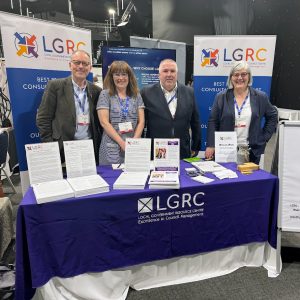Christmas 2025
| LGRC Christmas holiday hours
The LGRC office will be closed from 5pm on Tuesday 23 December to 9am on Monday 5 January. If you need to contact us urgently over the Christmas break, please get in touch with our CEO, David McKnight on david.mcknight@lgrc.uk Please mark any URGENT emails as such in the subject line and we will always respond; otherwise, we will deal with messages left when we return from the Christmas break. Happy Christmas from LGRC! |
Employment Law Change – Preventative Duty – Sexual Harassment in the Workplace
All UK Employers will be under a new duty to take reasonable steps to prevent sexual harassment of workers in the course of their employment from 26 October 2024. This new duty is contained in the Worker Protection (Amendment of Equality Act 2010) Act 2023. There are no exemptions.
Context:
3 in 5 women say they have experienced sexual harassment, bullying or verbal abuse at work – rising to almost 2 in 3 women aged 25 to 34 (CIPD)
One in three women report not telling their employer about what was they experienced (CIPD)
There is no cap on sexual harassment compensation awarded by an employment tribunal
Definition:
When a person is subjected to unwanted conduct of a sexual nature which has the purpose or effect of either violating their dignity, or creating an intimidating, hostile, degrading, humiliating or offensive environment
When a person is treated less favourably because they submitted to, or rejected, that unwanted conduct
It includes worker-on-worker harassment, harassment by third parties, and harassment by agents acting on behalf of the employer
The Legal Position:
Employers are vicariously liable for the actions of their employees unless they take reasonable steps to prevent harassment
Employers need to show that you have taken those reasonable steps when you are defending a claim at a tribunal
Employees can complain to the equality authorities that you are not taking reasonable steps to prevent sexual harassment even when no allegations have been made
Employers must take proactive preventative action in respect of your workers and third parties
Compensation at employment tribunal can be increased by up to 25% for failure to undertake this duty
Action required:
The Equalities and Human Rights Commission (EHRC) will have overview of UK employer and they advise the following steps:
Step 1: develop an effective anti-harassment policy – e.g. specify who is protected, state that sexual harassment will not be tolerated and is unlawful, state that the law requires employers to take reasonable steps to prevent sexual harassment of their workers
Step 2: engage your staff
Step 3: assess and take steps to reduce risk in your workplace – decide what steps are reasonable to take
Step 4: have a reporting process – incident log
Step 5: provide training bespoke to your workplace – training log
Step 6: know what to do if a harassment complaint is made
Step 7: dealing with harassment by third parties
Step 8: monitor and evaluate your actions
Summary:
- With the law on sexual harassment changing, you need to make sure you are ready for the new duty
- This process can begin now, by reviewing and updating what’s already in place
- A risk assessment of sexual harassment in the workplace should be carried out to identify what steps need to be taken
- The new Labour Government plans further changes to the law on employment under its manifesto pledge to ‘Make Work Pay’. An announcement is expected by the end of October and LGRC will bring you a summary of the legislative changes and implications for employers in the local council sector as soon as the plans are known.
Further information: What sexual harassment is – Sexual harassment – Acas
Sexual harassment and harassment at work: technical guidance | EHRC (equalityhumanrights.com)
Bethan Osborne, MA MCIPD
LGRC Partner and HR Consultant 03 October 2024
LGRC Building on Recruitment Success in 2024
Contacting LGRC over the Christmas Period
 LGRC offices are taking a Christmas break from Saturday 23 Dec and we will be back on Wednesday 3 January.
LGRC offices are taking a Christmas break from Saturday 23 Dec and we will be back on Wednesday 3 January.
However, we will always respond to anything urgent – just send us an email to info@lgrc.uk with ‘URGENT’ in the subject line or drop us a voicemail on 01404 45973 and we will pick it up and reply.
Otherwise, we will respond to normal enquiries when we return.
Thanks,
Best Wishes for Christmas and the New Year
David Mcknight,
Chief Executive
LGRC Employees Take Overall Control as Company Transitions to Majority Employee Ownership
In another reason to celebrate May Day, also known as Workers’ Day, Bristol-based LGRC Associates Ltd is delighted to announce the successful transition of this national business into majority employee ownership.
LGRC has been operating with a highly successful shadow arrangement in place for the last 12 months to ensure a smooth transition on the big day. Over the same period, the company has grown very significantly, consolidating its position as the leading provider of locum and consultancy services to the local council sector in England.
Founding company director Nick Randle OBE has been elected chairman for the current year before handing over the role to a partner in due course. Wendy Randle, also a founding company director, is company secretary.
Familiar LGRC faces are also taking on board directorships and key roles:
- Steve Milton becomes Vice-Chairman
- Louise Steele becomes Finance Director
- Karen Crowhurst becomes board Director
- David McKnight becomes Chief Executive
Janet Eustace takes on the chairmanship of the LGRC Associates Partners’ Employee Ownership Trust – which holds the transitioned company shares on behalf of the employees, represents the employees interests to the board, appoints trust directors to the board and works to manage the business.
As the company enters this new phase of its development, Nick and Wendy Randle have begun to pass control of the company to the Employee Ownership Trust (EOT) which now holds shares, appoints Trust directors and helps the main board manage the company on behalf of the group of employee partners who work for LGRC. It will also oversee the employee partners’ bonus arrangements which will be similar to the “John Lewis” model
Nick Randle OBE, chairman of LGRC, said:
“As our retirement approaches, it was incredibly important to Wendy and me that LGRC continues to thrive and to deliver the vision that brought it into being. What better way to achieve that, than by a transition to employee ownership, empowering the people who helped make this highly successful business what it is today, to manage its future .
James de le Vingne, chief executive of the Employee Ownership Association (EOA), said:
“We congratulate our members, LGRC Associates Ltd, on its transition to employee ownership; securing the ethos, values and culture of the business.
“Businesses that give employees a stake and a say build trust and shared responsibility, uniting leaders and employees behind a common purpose, and leaving businesses in a better position to flex and adapt.”
An EOT is an increasingly popular model of company ownership and management. This transition will lay the foundations for the future development of LGRC, which has an ambitious business plan to provide more high-quality skills and services to councils who are facing times of change.
As part of the transition process the founders, Nick and Wendy Randle addressed a non-binding, but well received, advisory letter of wishes to future boards of the company and its employee-owned trust. The letter set out the founders’ vision for the business and wishes for the future, as a reference for future generations of partners who will manage the business going forward.
LGRC was founded in 2014 by a small group of three directors, and in the time since then, has evolved to be the leading provider of temporary skills ,resources and expertise to the Local Council sector. With hundreds of successful assignments completed, the company has a strong reputation with clients and a wide portfolio of services it can offer.
LGRC is growing
|
||||||||||||||||||||||||||||||||||||||||||||||||||||||||||||||||||||||||||
Her Majesty Queen Elizabeth II
Nick and Wendy Randle and all the Partners and Associates at the Local Government Resource Centre join with the Royal Family and the nation in mourning the passing of Her Majesty Queen Elizabeth II. We recognise the sense of loss expressed by King Charles III at the point of his accession to the throne and wish him well as he commences his reign.
LGRC Plans Move to an Employee Owned Trust
In 2022 LGRC will commence a transition from being a company owned and managed by its founders to become one owned and managed by its employee partners.
LGRC was founded in 2014 by a small group of three directors and in the time since then has evolved to be the leading provider of temporary skills and resources to the Local Council sector. With hundreds of successful assignments completed the company has a strong reputation with clients and a wide portfolio of services it can offer. In 2021/22 the company turnover has grown by more than 50%.
Now the company is entering a new phase of its development as the current owners Nick and Wendy Randle begin to pass control of the company to an Employee Owned Trust ( EOT) which will hold shares , appoint directors and manage the company on behalf of a group of employee partners who work for LGRC. An EOT is similar to the “John Lewis” model of company ownership and management. This transition will lay the foundations for the future development of the company which has an ambitious business plan to provide more high quality skills and services to councils who are facing times of change.
Managing Director Nick Randle commented “ LGRC has far exceeded our expectations of it when we first established the service. Now we are providing a sound framework for the future as Wendy and I prepare to slowly step back once the EOT is established. The 5 year business plan is realistic but very exciting going forward”.
As part of the transition LGRC appointed a new General Manager, David McKnight in September 2021. That successful appointment has laid the foundation for the creation of the EOT. David said “LGRC, like any other successful business, needs to work at maintaining its market leadership. Becoming an employee-owned trust helps us improve efficiency, makes us more cohesive, and engages our people in running the business, resulting in increased benefits for clients.
LGRC partners welcomed the plan following a partners meeting in January and some of their comments are set out here .
Louise Steele said “As Local Council practitioners we’ve devoted years of our lives, sometimes entire careers, to this important, and often quirky, grass-roots level of local government. We do it because we love the sector and local democracy. LGRC provides valuable services to Local Councils and by directly engaging us in the management of the company it will be even more effective at delivering the services councils need.”
Steve Milton observed that “Nick and all of us here at LGRC aspire to deliver the very highest professional standards for every single client we support. Demand for our services has really exploded over the last few years and the new organisation structure is designed to meet the needs of Local Councils now and in the future. I’m super proud to be part of a team that delivers consistent results – providing top quality work for every one of our clients, every time. To be invited to join the Board really is the highlight of my local government career.”
Samantha Haywood commented “We believe that becoming an EOT will further bind partners together and enable us to continue being a high quality service provider for the local government sector with highly skilled, experienced, and engaged consultants committed and dedicated to improving Councils across the UK. Being part of an EOT has to be about the people and ensuring an efficient and effective service is provided every time.”
LGRC has recently joined the Employee Ownership Association to share the experience of other companies who have made the journey to employee ownership and to learn how to make the most of the benefits of this form of company governance.
We hope this move will reinforce the experience that clients have of our service and further increase the range of services we can offer.
LGRC Launches Local Council Climate Change Healthcheck
Local Councils have a significant role to play in addressing the climate change agenda within their communities and this has now become the number one public policy challenge of our lifetimes. Many councils have responded to by declaring a climate emergency and are looking to take action to eliminate carbon and other greenhouse gas emissions within their communities.
Now LGRC has developed a new Climate Change Healthcheck to assess the current situation within a Local Council’s area of operation and recommend an Action Plan. The emphasis is on practical actions that Local Councils can take and reflects best practice approaches such as those recommended by NALC and Friends of the Earth. It focusses on things that Local Councils can realistically do and is based on in three areas of action,
- Actions a Council can take with respect to its own assets ( Buildings, public open spaces etc.)
- Actions that the Council can within its own community on its own or with partners
- Actions the Council can take to educate the community on actions that they can take.
LGRC is now ready to assist Councils who are in need of a framework to build their climate change action plans
Contact us today to discuss how this might work for your Council.
- Think Globally, Act Locally
LGRC Appoints New General Manager
LGRC is pleased to welcome David Mcknight who joins us on 1st September as Company General Manager. David will pick up responsibility for working with clients and associates to set up and manage new assignments and administer the company on a day to day basis. David has a strong background in business and the third sector including experience in managing consultancy operations. His experience within the Local Council Sector was formed as economic development manager for Melksham Town Council.
David is based in North Yorkshire which will also provide a focal point for developing LGRC operations in the north and we are now seeking additional applications from associates based north of Birmingham.
David’s arrival will create capacity for company directors Nick & Wendy Randle to undertake further development work for the company. This will include launching new outsource products and further developing the associate training programme in the months ahead.
One of the benefits to arise from the difficult months of CoVid Lockdown has been the adoption of new technology for remote working. This has helped us to ensure that the best skills available around the country can be brought to bear to address client problems. We hope to continue to use remote working tools to ensure that we provide the best possible service to our clients.
LGRC in Transition. Seeking New Associates
After 6 successful years in operation LGRC is undergoing a transition to a new operating structure.
As this is unfolding and due to ongoing strong demand for our services we are seeking additional associates to undertake consultancy assignments in a range of technical areas, troubleshoot councils in difficulty or work as Locums in a variety of roles. You will have a good understanding of Town Parish and Community Councils gained either as a Clerk or Deputy Clerk, RFO or councillor. If your background is as an employee you will ideally have CiLCA and may be able to offer additional skills in technical areas such as HR, Finance, Governance, Asset Management or management of specific council services. If your background is as a member you will have a good understanding of how councils work and specific expertise in one of the technical areas above.
LGRCs future is as a partnership of technical experts working together and there will be opportunities for our associates to participate in managing and steering the company as well as undertaking fee paying assignments. If you are interested please visit our vacancies page and complete the online application form. LGRC Associates are placed on our register but no contractual obligation exists until an assignment contract is established.










